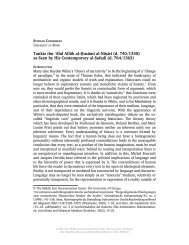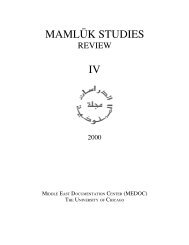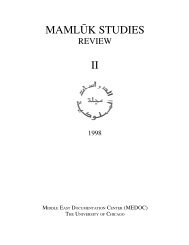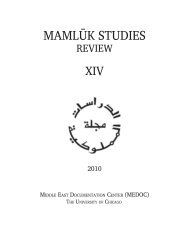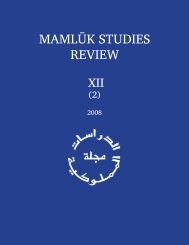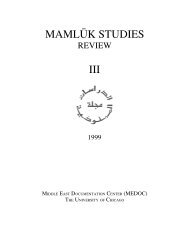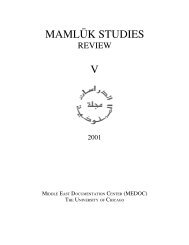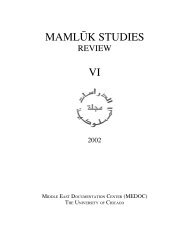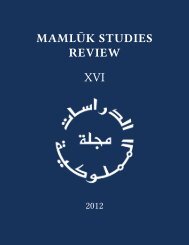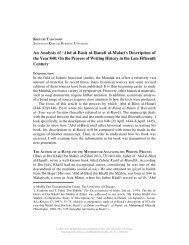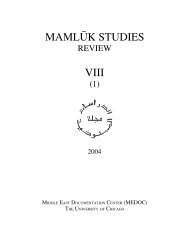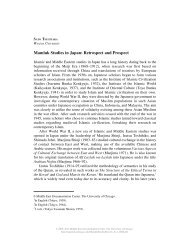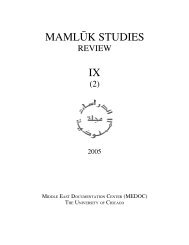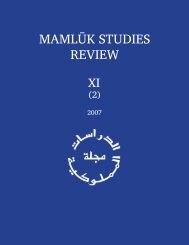Vol. VIII, no. 2 (2004) - Mamluk Studies Review - University of Chicago
Vol. VIII, no. 2 (2004) - Mamluk Studies Review - University of Chicago
Vol. VIII, no. 2 (2004) - Mamluk Studies Review - University of Chicago
You also want an ePaper? Increase the reach of your titles
YUMPU automatically turns print PDFs into web optimized ePapers that Google loves.
MAMLU±K STUDIES REVIEW VOL. 8, NO. 2, <strong>2004</strong> 21<br />
al-D|n ibn Taghlab would have made an impact. Resistance to taxation and to the<br />
local bureaucracy would have found an outlet through the shar|f's alleged descent<br />
from the Prophet, the local community's pride in its Arab lineage, and its adherence<br />
to the bedouin ideal <strong>of</strong> auto<strong>no</strong>my. Set against a <strong>Mamluk</strong> elite composed <strong>of</strong><br />
newcomers both to Egypt and to Islam, the shar|f evoked the value <strong>of</strong> lineage as<br />
well as the rights <strong>of</strong> the indige<strong>no</strong>us communities. As we remember, scorning the<br />
rule <strong>of</strong> the Turkish slaves, H˛is˝n al-D|n claimed that the Arab tribes were "the true<br />
owners <strong>of</strong> the land."<br />
In Ta≠r|kh al-Fayyu≠m wa-Bila≠dihi, al-Na≠bulus| provides us with a singular eyewitness<br />
account <strong>of</strong> social and eco<strong>no</strong>mic life in a medieval Egyptian province; we<br />
should listen to him very carefully. In particular, al-Na≠bulus| divides the population<br />
<strong>of</strong> the Fayyum into the Khaldu≠nian categories <strong>of</strong> badw and h˝ad˝ar, and tells us that<br />
almost the entire population <strong>of</strong> the Fayyum was badw. From the fiscal part <strong>of</strong> his<br />
survey we learn that the badw tribesmen lived, for the most part, in sedentary<br />
cereal-growing villages, which were dependent on seasonal inundation. The few<br />
h˝ad˝ar villages, on the other hand, cultivated cash-crops and were dependent on<br />
perennial irrigation. Moreover, the inhabitants <strong>of</strong> the h˝ad˝ar| villages were<br />
predominantly Christians while the badw villages were predominantly Muslim.<br />
Al-Na≠bulus|'s dichotomy <strong>of</strong> Christian h˝ad˝ar and Muslim badw meant that <strong>no</strong>t<br />
only were all the badw Muslims, but, more surprisingly, all the Muslims were<br />
badw. I have argued that the only plausible explanation for this demographic<br />
situation is that conversion to Islam by the indige<strong>no</strong>us Christian population was<br />
accompanied by the assumption <strong>of</strong> a badw tribal identity.<br />
Like the Arab tribesmen <strong>of</strong> the Fayyum, the majority <strong>of</strong> the tribesmen who<br />
took part in the large Arab revolts <strong>of</strong> the <strong>Mamluk</strong> period were peasants. Moreover,<br />
it seems that, as in the Fayyum, most <strong>of</strong> the Muslim peasantry in the Egyptian<br />
countryside had an Arab tribal identity. This Arab identity is best captured by the<br />
term ‘urba≠n, which was meant to distinguish the <strong>Mamluk</strong> tribesmen from the<br />
truly Arab tribes <strong>of</strong> the Arabian Peninsula. Unlike the original Arabs, most <strong>of</strong> the<br />
‘urba≠n lived a sedentary existence, but still claimed Arab descent and subscribed<br />
to the values <strong>of</strong> the <strong>no</strong>madic life-style. These claims, transmitted to us in several<br />
genealogical works composed in the <strong>Mamluk</strong> period, hold very little historical<br />
value. It is quite impossible that a large portion <strong>of</strong> the Egyptian peasantry were<br />
the descendants <strong>of</strong> a few tribal clans who arrived following the Muslim conquest.<br />
Rather, the claim to Arab descent by the Muslim inhabitants <strong>of</strong> rural Egypt must<br />
be understood as an attempt to negotiate the present. Bedouin-ness, that is the<br />
memories <strong>of</strong> an (invented) <strong>no</strong>madic past <strong>of</strong> independence and the pride in an<br />
(alleged) lineage in Islam, was an ideological antidote to the lowly status <strong>of</strong> the<br />
© <strong>2004</strong>, 2012 Middle East Documentation Center, The <strong>University</strong> <strong>of</strong> <strong>Chicago</strong>.<br />
http://mamluk.uchicago.edu/<strong>Mamluk</strong><strong>Studies</strong><strong>Review</strong>_<strong>VIII</strong>-2_<strong>2004</strong>.pdf



